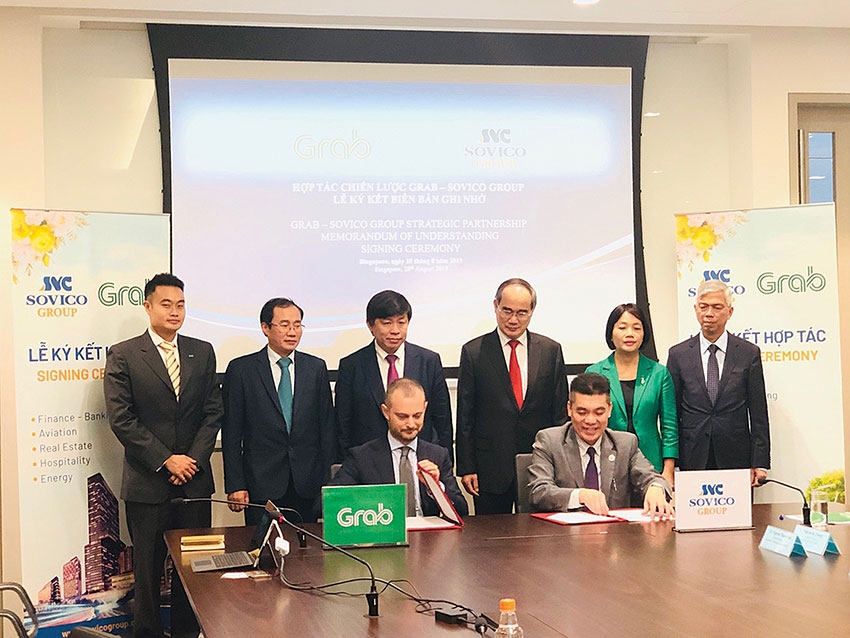Capital injection pushes up Grab super app vision
 |
| Grab and Sovico Group signed a strategic partnership in July, as witnessed by Nguyen Thien Nhan, Secretary of Ho Chi Minh City’s Party Committee (back row, third from right) |
What is the key focus for Grab as it pours half a billion US dollars into Vietnam over the next five years?
 |
| Jerry Lim |
The $500 million that Grab intends to invest in Vietnam will focus on three different areas. Number one is strengthening our core mature vertical – we want to continue to invest in the ride-hailing industry. Once a new decree that replaces the government’s Decree No.86/2014/ND-CP on business conditions for ride-hailing amongst consumers is confirmed, we will expand out of the current five cities that we are operating in, and we want to be able to offer our ride-hailing services to more cities as well. It is the same with food delivery – we are currently offering this service in 15 localities out of 63 provinces in Vietnam. We want to bring these benefits to more customers across the country.
With regards to payment, around 90 per cent of transactions in Vietnam are cash in general. On Grab’s platform, 35 per cent of transactions are cashless. We want to be able to bring more financial inclusion for people in Vietnam. We can help them to adopt digital payment solutions without going through bank accounts. Grab can also offer microloans for micro-entrepreneurs so they can start their business and have the opportunity to generate more income for themselves.
Secondly, we will invest in exploring opportunities in the fields of travel, hospitality, entertainment, healthcare, agriculture, grocery, and fast-moving consumer goods. There are so many new verticals that we are looking to launch, and we are ready to invest not only by ourselves but also by teaming up with local partners. We will also invest in startups and new businesses with solutions that are complementary to our platform as well.
The third area that we will invest in is the talent and workforce in Vietnam. Prime Minister Nguyen Xuan Phuc announced his focus on developing infrastructure to invest in technological innovations towards next year, including the target of having one million workers highly proficient in digital technologies. We set up our first research and development (R&D) centre in Ho Chi Minh City in 2017 and as of present, we have employed around 120 R&D engineers, all of whom are local.
At the same time, we will continue efforts to train, develop, and hire new tech talent so that they will become part of the highly-skilled workforce that Vietnam is focusing on. We will invest and work with local universities in education of talent. We are also going to work with Microsoft to bring more online training to make sure the younger generation in particular becomes more tech-savvy.
Grab and Sovico Group have announced a comprehensive strategic partnership. Could you elaborate on how this will make Grab more competitive in the market?
We have a very good relationship with Sovico Group. In July, Grab and Sovico’s affiliates, including Vietjet and Swift247, teamed up for a partnership that will provide better first-to-last mile logistics services and develop smart payment solutions.
With the technological solutions of Swift247, Grab and Vietjet will be able to connect air flights with road transportation, delivering goods via GrabExpress delivery services and Vietjet aircraft within five hours between Hanoi and Ho Chi Minh City.
Specifically, a Grab driver will pick up a package from a clients’ home or office, and deliver to Tan Son Nhat International Airport. Vietjet will clear the customs and bring it via plane to Hanoi. In Hanoi, another Grab driver will pick up the package and send it to the final destination – all of this carried out within five hours at a very affordable price.
What we have found is that there is no other provider in the market who can offer a similar service. They only provide next day delivery while we can offer same day delivery, which we considered a niche market. We believe this service will be successful in terms of volume as many online shoppers use e-commerce sites. If they need their products urgently, they are willing to pay more for the service to get the delivery within five hours. As Vietjet is an international airline company, we not only offer this servicein Vietnam but also all the countries that Vietjet flies to as well.
We have also formed a partnership with HDBank under Sovico. We want to be able to provide more financial services to both our driver partners as well as enable more users to come online to use Moca, Grab’s strategic partner in payments. Grab supports solutions in payment connectivity via e-wallet Moca.
Due to successful tie-ups, we want to bring this new partnership to new heights. Thus, Grab and Sovico formed a comprehensive strategic partnership to collaborate on mobility and logistics solutions in order to remove bottlenecks and improve the first- and last-mile delivery networks of Vietnam and Southeast Asia.
In addition, Sovico not only operates in aviation and finance, but also real estate, hospitality, and energy. To achieve more synergy between our businesses, we are currently looking at the clean energy sector, as we want to be able to accelerate the adoption of electric vehicles and hybrid vehicles in Vietnam. Sovico has the infrastructure network with gas stations so Grab can look into converting infrastructure into charging stations for e-bikes, for example.
Over the past decade, smart mobility has become a crucial topic in Vietnam due to an alarming increase in road vehicles. How does Grab help Vietnam achieve smart mobility solutions?
Public transportation plays a key role in reducing traffic congestion and pollution in major cities. A transition towards smart transportation has become urgent in order to help the cities combat these challenges.
There are many solutions to solve these challenges such as building a new train system, upgrading the public bus system, and adopting ride-hailing services. I believe that if more people switch to ride-hailing products, they are less likely to buy individual cars and motorbikes, and this is the area that we try to push towards.
Second, we want to contribute to improving connected mobility in Vietnam. The cities can enable people to take trains when the systems are put into operation in Hanoi and Ho Chi Minh City.
We encourage local people to adopt multi-mobility such as using bikes to get to the train station and from there to the downtown areas. Then they can choose either a bus or short walk to their office. We already have these multimodal solutions in place in Singapore, Indonesia, and the Philippines.
As Hanoi and Ho Chi Minh City plan to ban motorcycles from the central areas, the question is what will happen to the merchants who rely on motorbike delivery. The interesting thing is that we also have deployed GrabFood in Singapore but not all orders are carried out by scooters – some deliveries are made via bike or public transport.
Merchants in Vietnam may use either bicycle or bus to move in areas where motorbikes are banned. Grab will use technology to connect that person to the motorbike delivery service so the revenue will be split between two people.
This is what we are thinking about to support the government’s smart mobility solutions that are integrated with public transport. Smart mobility will not only improve traffic, but also benefit end-users in Vietnam.
What the stars mean:
★ Poor ★ ★ Promising ★★★ Good ★★★★ Very good ★★★★★ Exceptional
Related Contents
Latest News
More News
- Masan Consumer names new deputy CEO to drive foods and beverages growth (February 23, 2026 | 20:52)
- Myriad risks ahead, but ones Vietnam can confront (February 20, 2026 | 15:02)
- Vietnam making the leap into AI and semiconductors (February 20, 2026 | 09:37)
- Funding must be activated for semiconductor success (February 20, 2026 | 09:20)
- Resilience as new benchmark for smarter infrastructure (February 19, 2026 | 20:35)
- A golden time to shine within ASEAN (February 19, 2026 | 20:22)
- Vietnam’s pivotal year for advancing sustainability (February 19, 2026 | 08:44)
- Strengthening the core role of industry and trade (February 19, 2026 | 08:35)
- Future orientations for healthcare improvements (February 19, 2026 | 08:29)
- Infrastructure orientations suitable for a new chapter (February 19, 2026 | 08:15)

 Tag:
Tag:



















 Mobile Version
Mobile Version